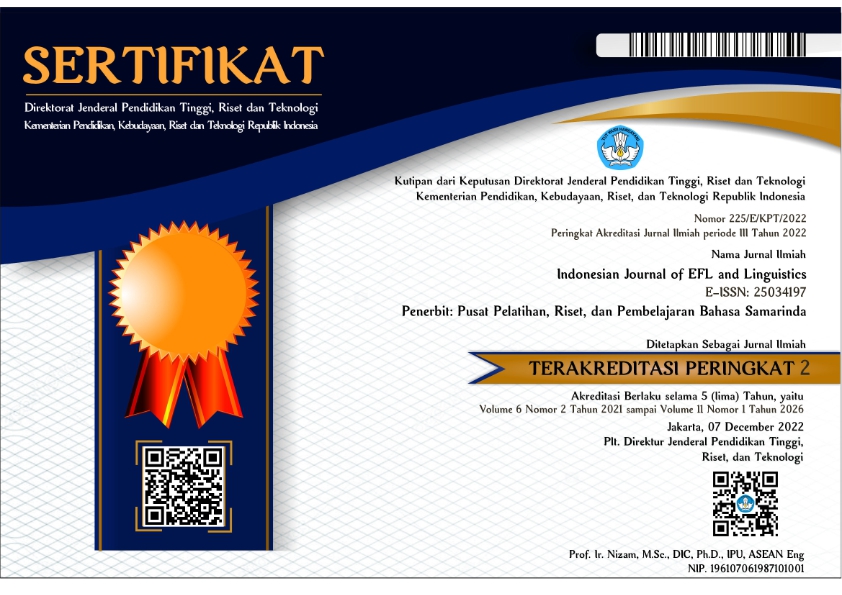BBC Radio Drama Series Cabin Pressure: Abu Dhabi for Giving Listening Exposure to Students: A View from Humour Perspective
Abstract
Using authentic materials to give listening exposure is essential to improve English language learners’ listening skill and using radio is one way to do so. To reduce anxiety in listening, choosing humorous material can be done as humour has been proven beneficial in classroom context, for example, in reducing stress. Using the partial result of a study conducted by the same author and completed by library study about ethics of using humour in the classroom, this study is to investigate whether verbal humour found in BBC Radio Drama Series Cabin Pressure: Abu Dhabi is suitable to be used in classroom context. Analysing every type verbal humour found in the radio drama, this study points out that verbal humour found in BBC Radio Drama Series Cabin Pressure: Abu Dhabi is generally not appropriate to be used in classroom because it has a quite high number of inappropriate verbal humour, such as sarcasm and satire.
Keywords: listening exposure, verbal humour, appropriateness.
References
Black, L., & Forro, D. (1999). Humor in the Academic Library: You Must Be Joking! or, How Many Academic Librarians Does It Take to Change a Lightbulb? College & Research Libraries, 60, 165-172. Retrieved September 13, 2017, from http://crl.acrl.org/index.php/crl/article/view/15276/16722
Cendra, A. (2016). A linguistic analysis of verbal humour found in BBC Radio drama series Cabin Pressure: Abu Dhabi. Undergraduate Thesis, Sanata Dharma Unoverity, English Language Education Study Program.
Dunkling, L. (1979). The English teaching radio script. In The use of the media in English language teaching (pp. 31-40). The British Council Printing and Publishing Department.
Field, J. (2002). The changing face of listening. In J. Richards, & W. Renandya (Eds.), Methodology in language teaching: An anthology of current practice (pp. 242-247). New York, United States of America: Cambridge University Press.
Goebel, B. (2011). Humor Writing:: activities for the English classroom. United States of America.: National Council of Teachers of English.
Hapsari, Y., & Ratri, D. (2013). Extensive listening: Let students experience learning by optimizing the use of authentic materials. Universitas Brawijaya Malang, Fakultas Ilmu Budaya. Retrieved September 19, 2017, from http://fib.ub.ac.id/wrp-con/uploads/Yulia-Hapsari-Seminar-dan-Lokakarya-Internasional-FPBS-UPI-2013.pdf
Howse, H. (1979). BBC English by radio and television - An outlinr History. In The Use of the Media in English Language Teaching (pp. 15-23). London: The British Council Printing and Publishing Department.
Jay, T. (2003). The psychology of language. Upper Saddle River: Pearson Education Ltd.
Krause, R. (2014). Humour – An ‘Important Spice to Use in Teaching’? On Humour and Its Uses in English as a Foreign Language Classrooms. Freie Universität Berlin, Institut für Englische Philologie. Retrieved September 5, 2017, from ttp://www.geisteswissenschaften.fu-berlin.de/we06/engdid/ressourcen/pdfs/hausarbeiten/Humour-in-EFL-Classrooms--Rebekka-Krause-.pdf
Odera, F. (n.d.). Learning English language by radio in primary schools in Kenya. Retrieved September 7, 2017, from https://wikieducator.org/images/8/8d/Florence_Y._Odera.pdf
Pham, H. (2014). The use of humour in EFL teaching: A case study of Vietnamese university teachers’ and students’ perceptions and practices. Phd Thesis, University of Canberra, Faculty of Art and Design, Australia. Retrieved September 5, 2017, from http://www.canberra.edu.au/researchrepository/file/f6fd3a90-c261-4768-9650-556354aac708/1/full_text.pdf
Shade, R. (1996). License to laugh: Humor in the classroom. Westport: Teachers Idea Press.
Tomalin, B. (1979). Using BBC English by radio and television in the classroom. In The use of the media in English language teaching (pp. 68-74). London: The British Council Printing and Publishing Department.




